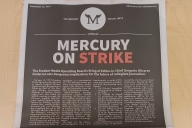You have /5 articles left.
Sign up for a free account or log in.
Let’s do a thought experiment. Rather than being employed by a college, let's say I'm employed by your edtech company. While working for your company, I publish a satirical blog post titled How the Amazon Echo Show Will Revolutionize Higher Education. Would I still be working for your company the day after this piece is published?
In that blog post, I tried to make fun of corporate boosters' tendencies to claim that the new technology will finally fix all that is wrong with higher education. The problem that I ran into is that our edtech world is increasingly difficult to satirize. We’ve grown accustomed to claims that higher education is “broken," and that the only fixes are for colleges to agree to conform to the culture of technology and to the realities of the market.
I thought some of my writing about the Amazon Echo Show would come across as an obvious parody of the most extreme sort of edtech solutionism. What I learned -- and you will see this if you read the comments below my article -- was that for many readers the joke was inadequately telegraphed. Some readers took a piece of satire as a real example of just the sort of over-the-top unthinking edtech boosterism that I was attempting to unpack and expose.
The fact that some folks got upset about what I wrote is not what is interesting. Satire is hard, and I could have done it better. Besides, people reading on the internet will always get upset.
What is more interesting, I think, is that I did not worry about the effect of this (minor) online backlash on my day job. As someone who works at a non-profit institution of higher learning, I feel that there are some degrees of freedom to express ideas that will prove unpopular. While my intellectual freedom is not absolute (I don’t have tenure and as a non-faculty educator never will), I do have a certain amount of latitude to publicly play with ideas.
My hope is that my future thinking and writing will get better, sharper and clearer. I hope to contribute to our national conversation on how we should be thinking about technology in higher education. The only way to become a better thinker and writer about edtech, however, is to write some things that will not always be clearly understood or well written.
Public writing is a way to figure out what one is thinking and to get feedback, and then use this experience and feedback to improve thinking. Would I have those degrees of freedom to write publicly -- and write things that will make some people mad -- if I worked for a for-profit company?
Not an Optimal Solution
It seems to me that most companies go out of their way not to offend. This has always struck me as not an optimal approach. Technology companies working in higher education should strive to be part of the conversation -- for relevancy, for mind share.
Sometimes this means engaging with the larger post-secondary world in a way that will cause some in our community to take offense. If everyone agrees with what you are saying, then you are not saying anything important.
My questions are sincere: Is not-for-profit higher ed the only place where I could work and still write what I want to write? Is there room for critical thinking about the edtech industry from within the edtech industry? Let me know.





